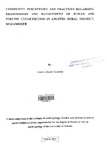| dc.description.abstract | This study was designed to investigate the Community perceptions and practices regarding transmission and management of human and porcine cysticercosis in Angonia rural district, Mozambique. The main assumptions that guided the study were: people's knowledge influences their perceptions of the transmission of neurological disorders in humans and white nodules in pigs; local practices related to pig rearing, culinary and hygiene favour the transmission of neurological disorders in humans and white nodules in pigs and, that the way people understand the causes of neurological disorders in humans and white nodules in pigs determine the means that they employ to cope with
the disease.
Data was obtained through survey, key informant interviews, narratives, focus group discussions and direct observations. Convenient sampling was used to obtain the sample size of 150 (100 pig keepers and 50 non-pig keepers) respondents. The study also included 5 traditional healers, 1 health worker and 5 people living with epilepsy. The quantitative data was analysed using SPSS and the information presented in tables of frequencies and figures. Qualitative data was analysed thematically.
The main findings of this study indicate that the community is familiar with porcine cysticercosis and epilepsy, but they have poor knowledge on the aetiology of the disease. Findings suggest that a number of factors may predispose the community and pigs to infection of T. solium. Factors, such as free range practices, lack of proper use of latrines and lack of veterinary field officers may contribute to the quick spread of white nodules in pigs; while, lack of knowledge on the T. solium life cycle, perceptions, home pig's slaughtering and lack of meat inspection, culinary practices and sanitary conditions may predispose people to infection of the disease. The study also found that there is a high prevalence of epilepsy, and this could be due to the high prevalence of
porcine cysticercosis in the study area.
This study recommends that campaigns and education are needed to increase awareness of cysticercosis transmission and the implementation of measures for its prevention and, further studies are needed to investigate the association between the high epilepsy
cysticercosis prevalence in the study area. | en |

